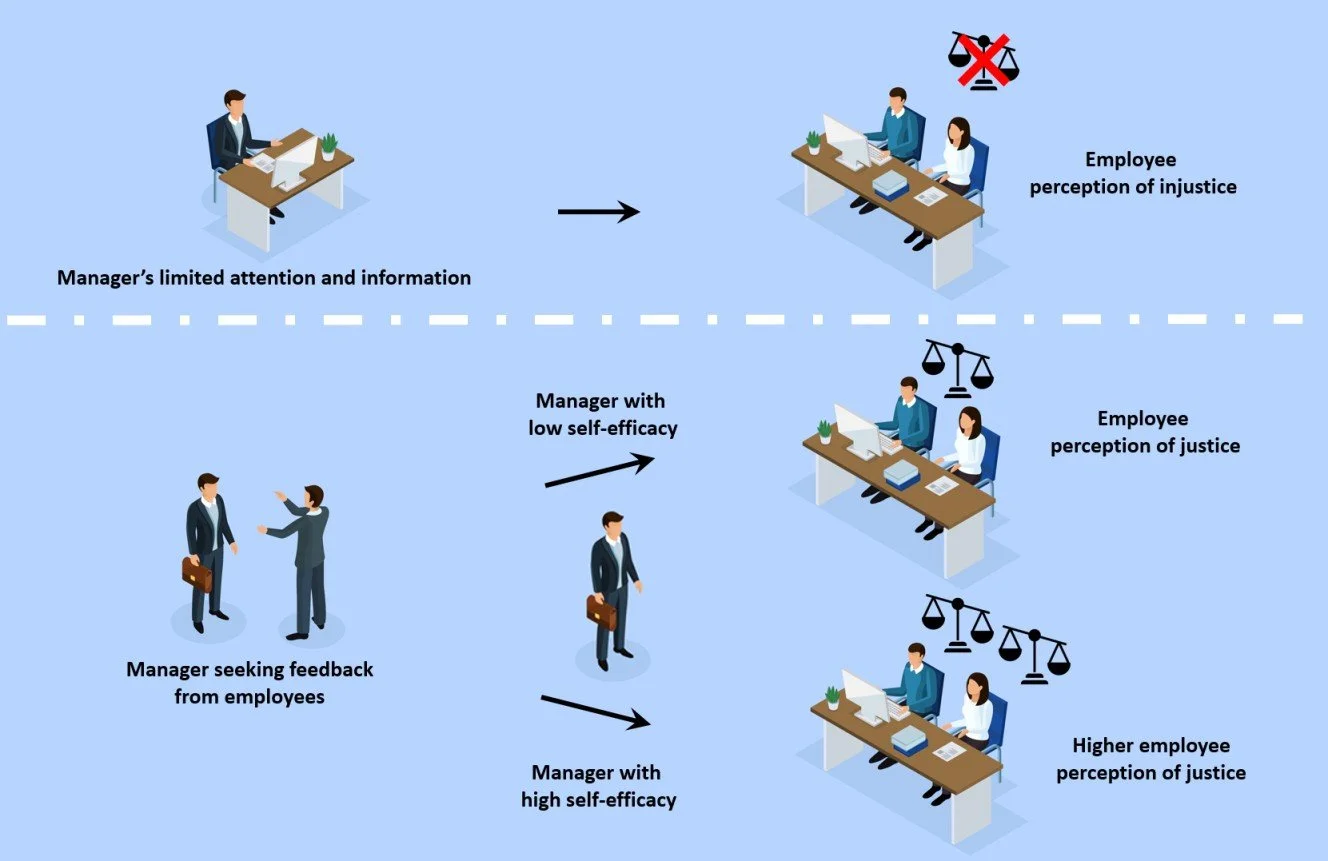Digest 33. Barriers to justice enactment? Feedback seeking could be the treatment!
Justice creates a trusting environment in organizations where employees would engage in positive work behaviors and enhance their performance (for more on justice/fairness check out Digest 2). Yet, creating just work environments is easier said than done and managers are faced with multiple barriers when it comes to enact justice. Two of such barriers are managers’ limited attention and limited information.
Limited attention refers to managers’ oversights, that happen when managers fail to consider justice or its relevance in certain situations - due to time pressure or being too focused on task performance or other priorities. For example, allocating a significant task to a newcomer to test his/her skills would be seen as unfair by other experienced employees while the manager may not realize it. Another example of lack of justice enactment would be a manager who does not adequately recognize the contribution of an employee in a certain task due to time pressure.
Limited information refers to the lack of contextual information about when, how, and to what extent managers need to enact justice. Particularly, these “contextual” information pertain to their collaborators preferences and expectations. Examples include acknowledging an employee’s efforts verbally while the employee expected a more tangible recognition, or assigning a challenging task to an employee to showcase his/her skills while the employee might perceive it as an unfair distribution of workload.
Overcoming these two barriers is key to increase justice enactment in organizations.
How to overcome limited attention and limited information?
Sherf, Gajendran, and Posner (2021) argue that the flow of information between managers and employees can help overcome these two barriers. When managers frequently seek feedback from their employees, they create opportunities for gathering solicited and unsolicited information about violations regarding perceived justice and the employees' work situation. This flow of information would help managers enact justice more effectively.
In this regard, Sherf and colleagues (2021) conducted multiple studies. In their first study, they used archival data on 8706 managers mostly from North America; in their second study, using a cross-sectional survey, they recruited 181 manager-employee dyads from various industries; and in their third study, using a longitudinal design, they recruited 196 managers from the United States. In this last study, after the screening survey and selecting the eligible respondents, they send a survey on personality differences (Time 1), a month later they sent another survey measuring feedback seeking and managers’ self-efficacy (Time 2), and another month later, they measured justice enactment (Time 3).
Based on these studies, Sherf and colleagues (2021) showed that managers’ feedback seeking from their employees has a positive effect on employees’ perception of justice. They also found that managers that have higher self-efficacy -that is, managers who have higher belief in their ability to perform and execute the appropriate behaviors in different situations- engage in more justice enactment when they seek feedback from their employees.
Organizational implications
To ensure a just environment in organizations:
Companies need to encourage their managers to frequently seek employee feedback concerning their own performance. In addition to increase managers’ justice enactment, feedback seeking also leads to higher employee performance, creativity, and improved relationships.
Companies can also help managers who are low in self-efficacy to benefit more from feedback seeking by providing them with coaches and mentors helping them interpret employees feedback better.
While most focus has been on employees’ seeking feedback (have a look at Digest 23), and, to some extent, managers seeking feedback from external sources (check out Digest 24), less attention has been given to managers seeking feedback from their employees with the aim of helping the employees. Therefore, companies should also encourage managers to seek feedback from their employees as well as other sources.
Managers are invited to consider feedback seeking as a tool that would assist them in paying more attention to issues related to justice and its relevance, as listening more enables better understanding employees' needs, perceptions, and preferences (look at Digest 10 on how to become a better listener).
——
Reference: Sherf, E. N., Gajendran, R. S., & Posner, B. Z. (2021). Seeking and finding justice: Why and when managers’ feedback seeking enhances justice enactment. Journal of Organizational Behavior, 42(6), 741–766. https://doi.org/10.1002/job.2481

